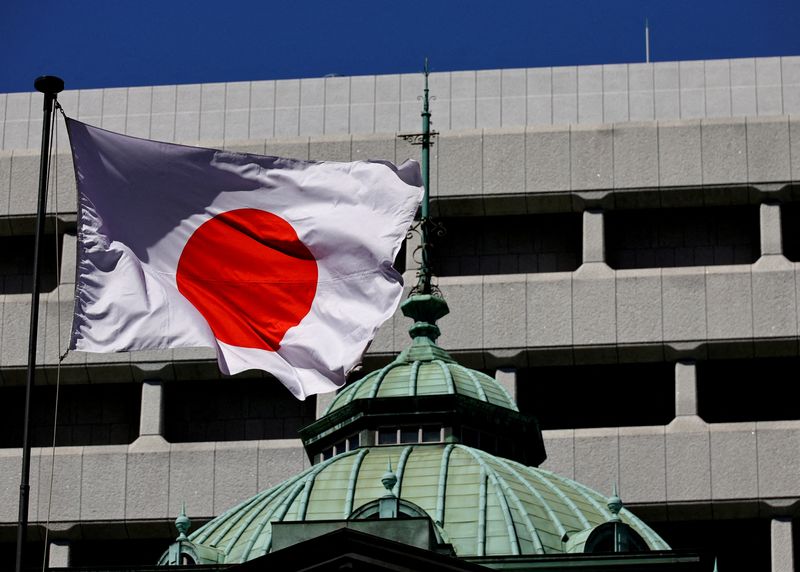By Leika Kihara
JACKSON HOLE, Wyoming (Reuters) -The U.S. Federal Reserve’s dovish shift will possible give the Financial institution of Japan some respite in its battle to tame a weak yen, however might complicate its efforts to boost rates of interest if the 2 central banks’ diverging coverage paths preserve markets jittery.
At an annual symposium in Jackson Gap, Wyoming, Fed Chair Jerome Powell stated on Friday “the time has come” to chop charges as rising dangers to the job market left no room for additional weak point, providing an express endorsement of an imminent coverage easing.
The remarks got here hours after BOJ Governor Kazuo Ueda instructed parliament that whereas the BOJ will preserve a watch out on the fallout from unstable markets, it should proceed to hike charges if inflation stays on observe to durably hit its 2% goal.
The yen rose in opposition to the greenback after Ueda’s remarks and prolonged its beneficial properties on these from Powell, as markets centered on prospects of a narrowing U.S.-Japan rate of interest hole.
“The yen buying today is understandable given Governor Ueda showed very little sign of a shift in the views and plans of the BOJ following the financial market turmoil earlier this month,” stated Derek Halpenny, head of analysis world markets EMEA at MUFG, in a word to shoppers.
The Japanese forex’s rebound comes as a aid for the BOJ, which has been underneath political strain to stem its falls that harm consumption by inflating imported meals and gas prices.
However the BOJ’s fee hike path is filled with uncertainty as Japan swims in opposition to the worldwide rate-cut tide, which might go away its forex and inventory costs inclined to wild swings.
Having seen market rupture after the BOJ’s July fee hike, the Japanese central financial institution already feels the necessity to tread slowly and thoroughly.
“Markets at home and abroad remain unstable, so we will be highly vigilant to market developments for the time being,” Ueda stated on Friday, including that huge market swings might have an effect on coverage selections in the event that they alter the board’s inflation projections.
Home political concerns additionally complicate the BOJ’s fee hike path as Prime Minister Fumio Kishida, who appointed Ueda to the highest BOJ put up, is ready to step down and move the baton to the winner of a ruling social gathering management race in September.
Whereas most main candidates to succeed Kishida have embraced the BOJ’s plan for average fee hikes, it’s unsure whether or not the brand new premier will help larger borrowing prices if risky markets weigh on company earnings.
“With so much uncertainty, the BOJ probably won’t be able to take bold steps,” stated former BOJ board member Makoto Sakurai, ruling out the prospect of one other fee hike this 12 months. “Until the domestic political situation stabilises, the BOJ might find it hard to raise rates,” he stated.
A modern ballot by Reuters confirmed a majority of economists count on the BOJ to hike charges once more this 12 months, however extra see the prospect of it taking place in December somewhat than October.
FRAGILE ECONOMY A RISK
The BOJ’s shock resolution to hike charges in July and Ueda’s sign of additional fee hikes jolted monetary markets earlier this month, forcing his deputy to supply dovish reassurance that no hikes will likely be coming till markets stabilise.
The important thing message from Ueda’s remarks in parliament on Friday was that whereas the BOJ will likely be in no rush to hike charges, the market rout will not derail its longer-term plan to maintain pushing up borrowing prices, stated two sources accustomed to its pondering.
Large knowledge evaluation of latest BOJ commentary underscores the financial institution’s rate-hike stance with its bias on inflation remaining “very positive,” stated Jeffrey Younger, chief govt officer of DeepMacro, a U.S. fintech agency that conducts AI-driven analyses of financial indicators and policymakers’ feedback.
“Could we get another one by the end of the year? Well, probably. I think that’s what the model is saying,” he stated on the prospect of one other fee hike by the BOJ.
“If you have inflation and growth on the firm side, and you have BOJ rhetoric still biased to say that inflation and growth are both okay, the only thing that would really stop it from raising rates would be market fallouts.”

Some analysts, nevertheless, are extra cautious in regards to the power of Japan’s financial system. Whereas consumption rebounded within the second quarter, rising dwelling prices have weighed on family sentiment. A U.S. slowdown might additionally weigh on exports.
“Domestic demand is very weak,” stated Sayuri Shirai, an educational at Keio College in Tokyo. “From an economic perspective, there’s little reason for the BOJ to raise rates.”




